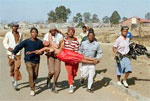Former Vaal policeman, Sergeant Gerhardus "Pedro" Peens admitted that he was in the Vaal Triangle (now Gauteng) township of Boipatong on 17 June 1992 when several people were killed and others injured in what became known as the Boipatong massacre. An estimated 300 armed residents of the Inkatha-aligned KwaMadala hostel shot and hacked people at the township of Boipatong, leaving 46 people dead and scores injured.
At the time, it was suspected that the attack was organised by the Third Force, a conservative part of the then police force and government colluding with members of the Inkatha Freedom Party (IFP) to destabilise the country and disrupt the Convention for Democratic South Africa (Codesa). The IFP and the government denied any involvement in township violence. The African National Congress (ANC) claimed that the police were complicit in the massacre and suspended its participation in the negotiations indefinitely and also withdrew from CODESA. The ANC also blamed the then President, Frederick W. De Klerk, for not doing enough to stop the violence.
The Amnesty Committee of the Truth and Reconciliation Commission later could not find evidence that the police were involved, as the ANC claimed. Peens's admission exposed police denials that none of their members were present during the Boipatong massacre as false. During his testimony before the Truth and Reconciliation Commission's amnesty committee Peens claimed that when a group of residents started throwing stones at them he and his team decided to vacate the area. Peens left the police force after the 1994 elections to work as a private investigator.
This Day in History: January 22, 1999
Additional Date: January 22, 1999
